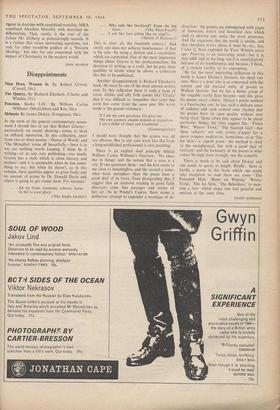Disappointments
IN the teeth of the general contemporary assess- ment I should like to say that Robert Graves— particularly on recent showing—seems to It'ave an inflated reputation. In this collection, apart from two or three poems—Dance of Words' and 'The Metaphor' come off beautifully—there is to my ear nothing worth keeping. I think he is writing—or at any rate publishing—too much. Graves has a style which is often literary and archaic--and it is acceptable when he has some- thing to say; but when he doesn't, as in this volume, these qualities appear as gross faults and no amount of praise by Dr. Donald Davie and others is going to get round them. For instance: . . . All my fruits, fountains, arbours, lawns In fief to your glory.
('The Ample Garden') . . . Who calls her two-faced? Faces she has
three: ('The Three-Faced') . I saw her face ashine like an angel's:
('Dazzle of Darkness')
This is, after all, the twentieth century! And surely one does not achieve timelessness--if that is the aim—by using a diction and a vocabulary which are outmoded. One of the most impressive things about Graves is his professionalism, his devotion to writing as a craft, but he puts these qualities in doubt when he allows a collection like this to be published.
Another disappointment is Richard Eberhart's book. He must be one of the most uneven writers ever. In this collection there is such a train of trivia, cliches and silly little poenis like 'Clocks' that it was difficult to remember that some fine work has come from the same pen. His worst mode is the pseudo-visionary:
If I ask my own questions, life gives me
My own answers, despite systems or prejudices. I am a defier of times and treacheries . .
('Contemplation') I should have thought that the system was all too obvious. But in any case work like this from a long-established professional is very puzzling.
There is an explicit dual principle behind William Carlos Williams's Paterson: 'No ideas but in things' and the notion that a man is a city. If one questions these—and the first seems to me close to meaningless, and the second a some- what weak metaphor—then the poem loses a good deal of its force. Even disregarding' ibis, I suggest that an attentive reading in good faith discovers some fine passages and reams of hot air. As in Pound's Cantos, there seems a deliberate attempt to engender a mystique of in- direction : the poems arc interspersed with pages of footnotes, letters and historical data which tend to destroy any unity the work possesses. And the argument that the world is untidy, and that therefore works about it must be, etc., has, I take it, been exploded by Yvor Winters years ago. Paterson is an interesting work—but it is very odd; and in the long run it is unsatisfactory because of its formlessness and because, I think, of a certain facility in its conception.
By far the most interesting Collection in this batch is James Dickey's Helmets, his third vol- ume. Here is a poet who is as concerned with the texture and the musical unity of poems as Wallace Stevens--but he has a better grasp of the tangible world than Stevens—and this gives his poems more solidity. Dickey's poetic method is a fascinating one; he has such a delicate sense of cadence and such control over rhythm that his poems have an open quality without ever being slack. Quite often they appear to be about particular things; the titles suggest this: 'Fence Wire,' Winter Trout,' The Scarred Girl'—but these `subjects' are only points d'appui for a more complex meditation. Sometimes, as in The Ice Skin'—a superb poem—the method is close to the metaphysical, but with a good deal of restraint; and the humanity of the poems is what comes through most strongly, not the conceits.
There is much to be said about Dickey and one needs to quote at length. Briefly: there is hardly a poem in this book which one could take exception to—and there are some—The Poisoned Man,' Bums on Waking,' Winter Trout,' The Ice Skin,' The Beholders,' to men- tion a few—which make one feel grateful and envious at the same time.
KEITH HARRISON


































 Previous page
Previous page